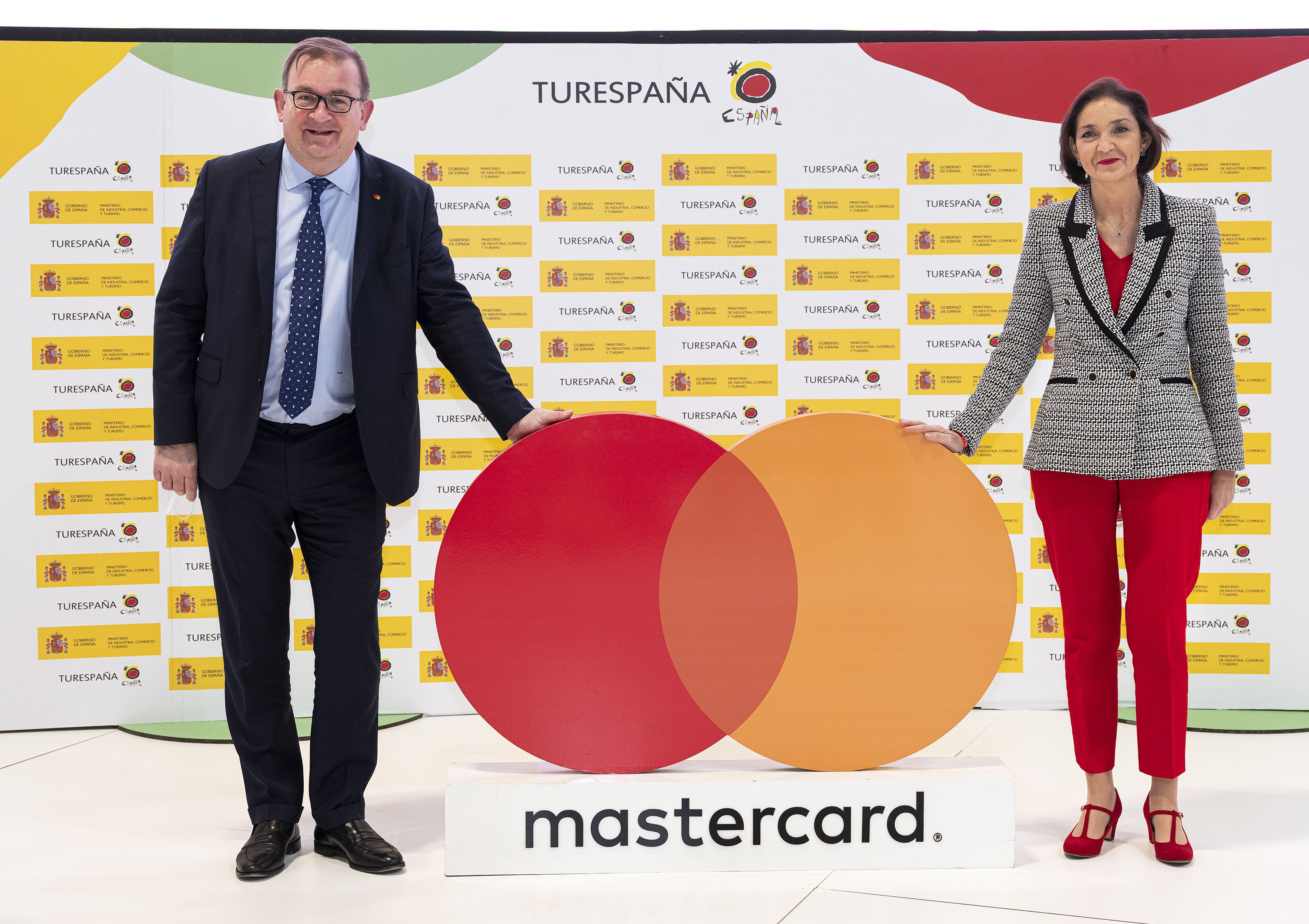Mastercard announced today the establishment of a new Tourism Innovation Hub in Spain, with the support of the Spanish Government. The Hub, based in Madrid and which will open in the second quarter of 2022, will develop solutions to support a sustainable and inclusive recovery for the global tourism sector through innovation, research and collaboration across the ecosystem. The initiative was ratified today, at the FITUR International Tourism Fair, between Reyes Maroto, Spain’s Minister of Industry, Trade and Tourism, and Mark Barnett, President of Mastercard Europe.
In 2019, travel and tourism represented 10.4% of global GDP but nearly halved to 5.5% in 2020 – similarly international visitors spent US$1,691.5 billion in 2019 and the amount dropped to US$517.6 billion in 20201. And according to its latest forecast, the World Tourism Organization (UNWTO) estimates that international tourist arrivals remained 70 to 75 percent below 2019 levels last year2. The impact also goes beyond GDP figures, with the industry playing a vital role in generating jobs and creating opportunities for micro and small businesses around the world.
But despite the clear challenges, Mastercard data shows that there are opportunities for a robust recovery in the relatively near future. Many consumers are looking at how to spend their share of the extra US$5 trillion saved since the onset of COVID-193, and travel ranks second only to eating out as the out-of-home activity most missed during lockdowns4. There has been a clear willingness to travel that has been determined by pandemic-related restrictions.
“There has been a multi-trillion dollar impact on the global tourism industry over the past couple of years, but Mastercard is committed to enabling innovation and ensuring that technology is harnessed for a more inclusive, equitable and sustainable recovery,” said Mark Barnett, President of Mastercard Europe. “The Tourism Innovation Hub will foster programs and build partnerships which will help the industry recover and drive more inclusive and sustainable tourism growth. Being located in Spain will allow us to leverage the expertise of a country intrinsically linked to tourism and the second most visited destination in the world.”
According to the Spanish Minister of Industry, Trade and Tourism, Reyes Maroto: “The Spanish Government believes that now is the time for us to work together to build the future of our post-pandemic tourism model. We are going to stop measuring the success of the Spanish tourism model exclusively by the increase in the number of tourists – we must now go beyond this and focus on quality, profitability, innovation and sustainability, as well as social inclusion and territorial cohesion. There is no time to lose in taking up this challenge. And we all need to work together – the institutions and the private sector – strengthening our alliances and bringing other partners on board so that the Spanish tourism sector maintains its international leadership.”

UNWTO Secretary-General Zurab Pololikashvili added: “Tourism’s future will be driven by new ideas, new business methods and through joined-up solutions to overcome challenges and fulfil our sector’s enormous potential. UNWTO warmly welcomed the creation of a new Tourism Innovation Hub and looks forward to working closely with Mastercard to harness the power of data and creativity to build a more inclusive and sustainable sector.”
The Tourism Innovation Hub will act as a global platform for industry research, tourism strategy development and the co-creation of tailored products and solutions, through partnerships and initiatives such as:
Thought Leadership: leveraging data insights and capturing target consumer insights to identify trends and inform policy decision-making.
Development Center: co-creating new products and services, codifying best practices and serving as a platform to bring together public and private sector partners to innovate together.
Labs As A Service: designing, developing and testing new products and platforms that deliver digital first, sustainable and inclusive solutions for the industry, which address common business and consumer priorities.
Supporting the Global Tourism Industry
Mastercard’s trusted network and leading technology stands at the heart of the global tourism industry:
Facilitating payments so tourists can spend safely, securely and easily when they travel abroad
Enabling digital payments acceptance for small businesses to allow them to benefit from the tourism economy
Working with travel agents, airlines, hospitality providers and many others across the ecosystem
Building loyalty through engagement programs and Priceless Experiences, giving tourists tailored access to the best and most exciting opportunities when they explore or return to preferred destinations
Partnering with tourism agencies to supporting businesses in the tourism industry and encouraging inbound tourism through digital vouchers and incentive schemes
Providing data insights to governments and tourism agencies to identify trends and inform strategies, including through the Mastercard Economics Institute Insights Reports, as well as executing inbound tourism campaigns.
Sustainable tourism will be a key focus, and there will be close collaboration between the Tourism Innovation Hub and Mastercard’s Sustainability Innovation Lab, to help empower governments, businesses and consumers to transform how they adapt and create new sustainable tourism innovations in destination, travel, accommodation, experience, rewards and incentives and other services.
Alongside this, Mastercard is working with the UNWTO, headquartered in Madrid, across a range of initiatives. For example, last year the company supported the UNWTO SDGs Global Startup Competition, providing mentorship to innovative small businesses that are enabling sustainable and responsible tourism around the world.
In Spain, Mastercard has a well-established track record of supporting the tourism industry, as part of the broader work with governments and cities around the world adapt their tourism strategies. In 2020, Mastercard’s data intelligence tools helped the City Councils of Madrid and Barcelona identify how the flow of tourists were being impacted, helping them
Source: Turizmpress.com